U.S. News 2025 “Best Schools” rankings
U.S. News and World Report released its “Best Schools” rankings for K-8 public schools.
They ranked the best public elementary schools by state. For Indiana, 1,000 elementary schools were ranked and 487 middle schools.
P-H-M’s elementary schools are at the top of the list:
- Northpoint #1 in Indiana
- Prairie Vista #2 in Indiana
- Horizon #19
- Mary Frank #32
- Bittersweet #56
- Moran #163
- Madison #200
- Elm Road #205
- Elsie Rogers #393
- Meadow’s Edge #239
P-H-M’s middle schools were also recognized:
- Discovery #3 in Indiana
- Schmucker #40
Spotlight on Bittersweet students at PHM Board Meeting
Our school hosted the Monday, October 7 P-H-M Board of School Trustees meeting. It was an opportunity to shine the spotlight on some of the amazing things our students and staff are doing.
Principal Shonda Masterson kicked the meeting off by sharing with the School Trustees Bittersweet’s test data–Bittersweet students scored in the Top 5% of schools on last year’s ILEARN. Principal Masterson credited the teachers and the use of formative assessment with a focus on fostering stronger and more confident student writers.
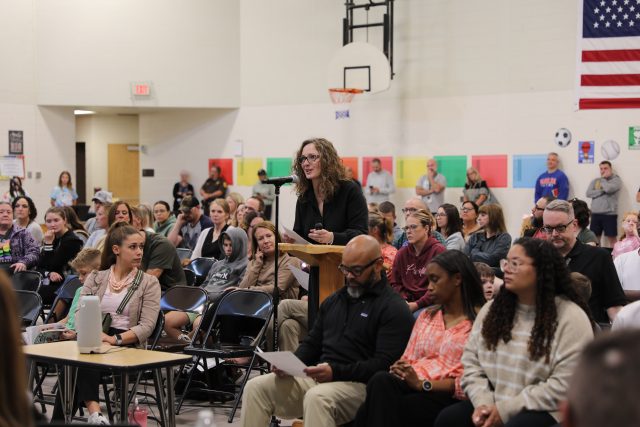
Creative writing exercises are being used at all levels. As an example second graders wrote about their field trip to Kercher’s Apple Orchard using their story vocabulary words. Alyssa Moles, Emmalyn Fazi, Steven Johnson, Cami Cromartie read their stories to the Board Members.
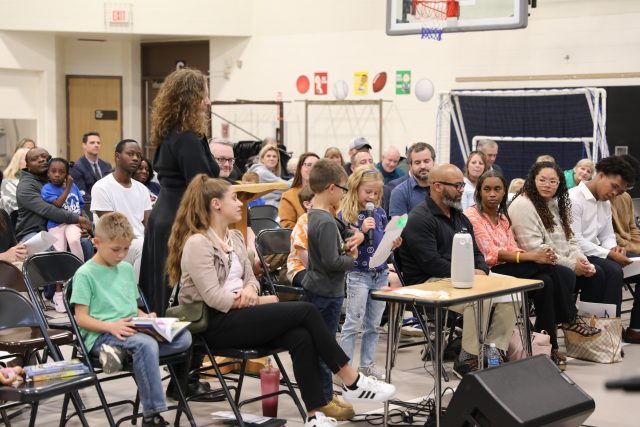
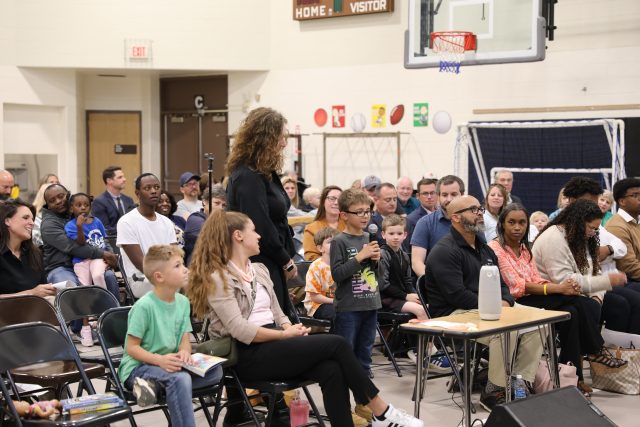
Other Bittersweet highlights included:
- pictures from 1st grade’s visit to nearby Garden at Chapel Hill Cemetery last Memorial Day to honor deceased veterans
- the Pen Pals program for 1st and 5th graders to other P-H-M elementary schools
- sharing the Bittersweet P.A.W.S. Pledge written by Media Aide Julie Villalba
The spotlight on Bittersweet ended with a performance by Mrs. Cayleen Balbo-Veal’s 5th grade music students.
P-H-M Schools Receive $53,600 in Robotics Grants
Today the IDOE announced the recipients of the K-12 Robotics Competition Grants and 15 Penn-Harris-Madison robotics teams from eight P-H-M schools were awarded a total grant of $53,600!
- Penn High School (2 existing teams) – $14,000
- Grissom Middle School (2 existing teams) – $5,000
- Bittersweet Elementary School (1 new team) – $3,175
- Elm Road Elementary School (2 existing teams) – $6,137.50
- Horizon Elementary School (2 existing teams) -$6,137.50
- Meadows Edge Elementary School (1 new team) – $3,175
- Northpoint Elementary School (4 new teams) – $12,800
- Walt Disney Elementary School (1 new team) – $3,175
For all teams, existing and new teams, the grant pays for coaching stipends, team registration, competition registration, game specific materials, and supplies for building competition robots. Funds can also be used for transportation to events.
For existing teams, most of their supplies will be updating and replacing used parts, tools, storage, and new parts needed for the new game. New teams’ supplies will be start-up kits, tools, storage, and game specific parts.
The P-H-M proposal was selected from more than 145 grant proposals submitted for this funding opportunity, 137 school corporations and non-profit groups were ultimately chosen. The IDOE review team was impressed with P-H-M’s plan to design, construct, program, and participate in competitions with the goal of increasing Indiana student interest in STEM.
This grant removes barriers for schools and gives students opportunities to excel. It also creates a P-H-M pipeline of future Kingsmen robotics students with experience and excitement about robotics. Ultimately this opportunity gives students more STEM co-curricular experiences and broadens their horizons for future careers.
P-H-M Educators Recognized at 2024 IDOE Excellence Gala
Grissom Middle School was recognized at the third annual Indiana Educational Excellence Awards Gala held in Indianapolis on Friday, September 6. Grissom won the Excellence in Academic Gains Award.
This prestigious award comes with a grant of $177,000! Schools must use the grant funds as indicated by the IDOE to continue the amazing work that the school was doing to earn the recognition; or choose to spend the money on projects related to any of the Educational Excellence Awards categories.
The Excellence in Academic Gains Award recognizes an individual school that has made the most progress in improving achievement for all students. One or more of the following must be demonstrated by the award recipient:
Grissom won the Excellence in Academic Gains Award, which recognizes an individual school that has made the most progress in improving achievement for all students. One or more of the following must be demonstrated by the award recipient:
- increased academic achievement for students as indicated by ILEARN English/language arts/Mathematics assessment results
- prioritization of initiatives focused on accelerating learning
- implementation of progress monitoring and evidenced-based practices for students in need of extra support
On hand for Grissom’s award recognition at the Gala were P-H-M Superintendent Dr. Jerry Thacker, Principal Jenn Sinclair, Assistant Principals Eric Spatt and Greg Stover, Director of Student Services Dr. Jenny Sears, and 8th grade ELA teacher Josh Kelver.
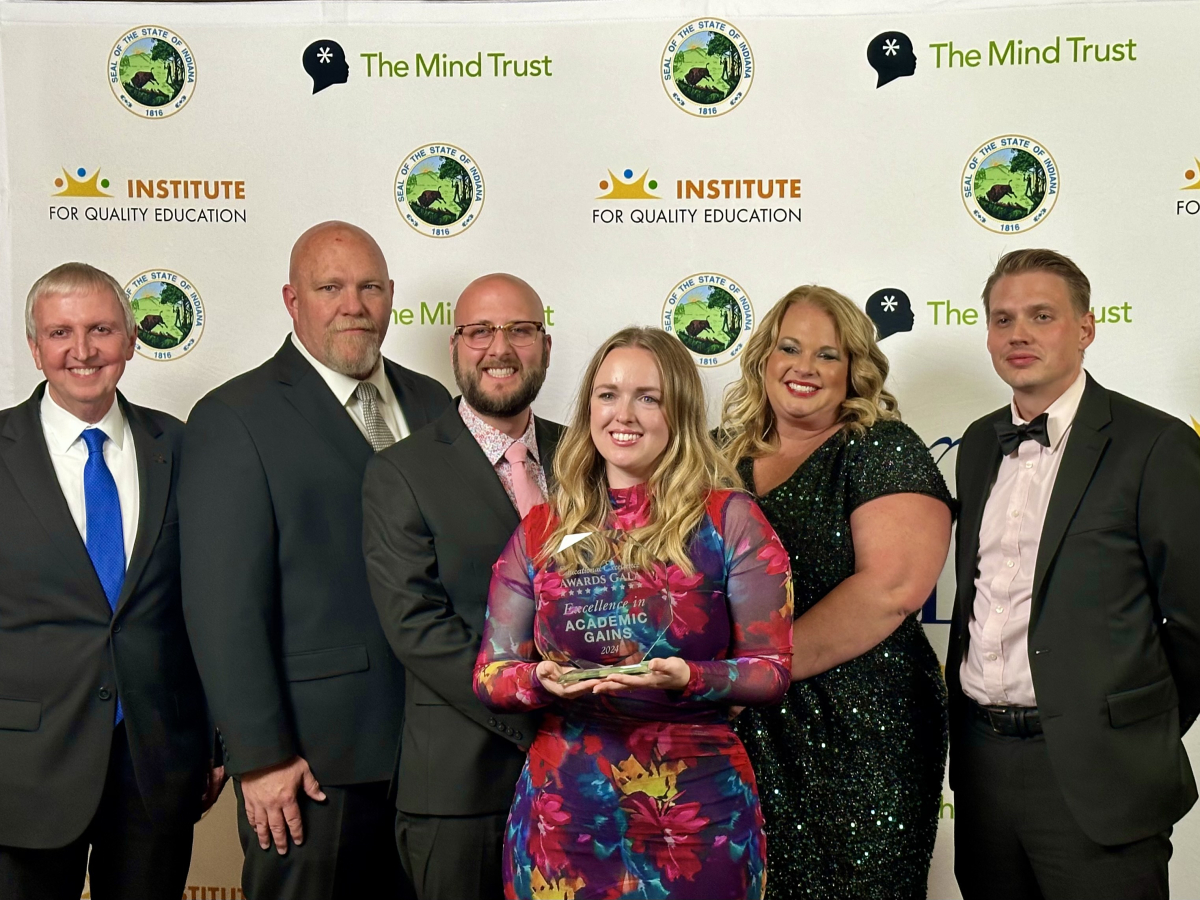
The IDOE Excellence Gala also shown the spotlight on the finalists for the 2024 Indiana Teacher of the Year, Indiana’s 2023 Milken Educator Award recipients, and other dedicated educators from across the state.

A Penn-Harris-Madison school has either won or been recognized at the Indiana Department of Education an Educational Excellence Award since it’s inception in 2022:
- Fall 2023, Penn High School was recognized with the Excellence in College Readiness Award and received a $250,000 grant from the IDOE!
- In 2022, then Walt Disney Principal Ryan Towner was recognized as Indiana’s 2021-2022 Milken Award winner. Principal Towner was also recognized at the 2023 event as the Milken Award winner.
- Also in 2022, teacher Amanda Fox was recognized as Indiana’s finalist for the Presidential Awards for Excellence in Mathematics and Science Teaching (PAEMST). Mrs. Fox was also recognized at the 2023 Gala for being a Top 10 Finalist for Teacher of the Year.
P-H-M Named 2023 Best Community for Music Education
Penn-Harris-Madison School Corporation was named among the Best Communities for Music Education (BCME) in the country by the National Association of Music Merchants (NAMM) Foundation for the 10th year in a row!
Now in its 24th year, the 2023 Best Communities for Music Education program has recognized 830 school districts and 78 schools across the country for the outstanding efforts by teachers, administrators, parents, students, and community leaders and their support for music education as part of a well-rounded education for all children.
Penn High School offers the Fine Arts & Communication Academy as part of its unique academy structure. The seven academy design provides Penn students with relevant and meaningful coursework taught in smaller, supportive environments where each student is known well by his teacher and peers. Nearly a third of Penn’s approximately 3,800 students are enrolled in the Fine Arts Academy with the majority being involved with music programs, either Choir, Orchestra, Band or another music program. Every year the Penn Fine Arts Academy enlists choir, band and music students to do a tour of P-H-M elementary schools to get students more interested in music.

In our elementary schools, music class is part of the regular curriculum following state standards. Students are instructed in both vocal and instrument classes. Beginning in 6th grade, P-H-M students at our three middle schools (Discovery, Schmucker and Grissom) have the opportunity to choose choir, orchestra or band as their music elective. Students at Discovery also have the option of choosing Piano Lab. Schools from elementary all the way up to Penn High School also perform musicals.
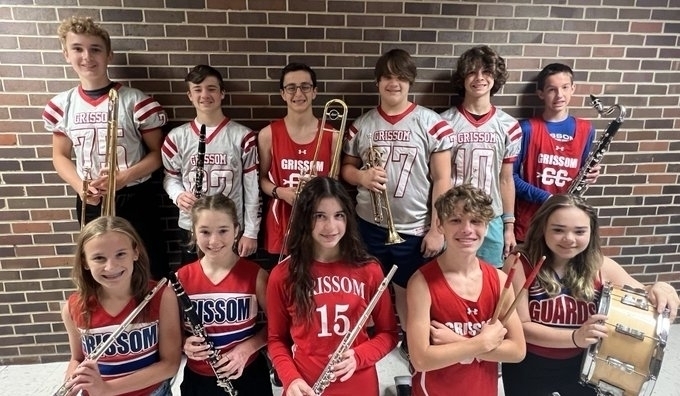


To qualify for the Best Communities designation, P-H-M answered detailed questions about funding, graduation requirements, music class participation, instruction time, facilities, support for the music program, and community music-making programs. Responses were verified with school officials and reviewed by The Music Research Institute at the University of Kansas.
Research into music education continues to demonstrate educational/cognitive and social skill benefits for children who make music. In a series of landmark studies by scientists and researchers at Northwestern University a link was found between students in community music programs and life-long academic success, including higher high school graduation rates and college attendance. In another study from the University, it was discovered that the benefits of early exposure to music education improves how the brain processes and assimilates sounds, a trait that lasts well into adulthood.
Beyond the Northwestern research, other studies have indicated that music education lays the foundation for individual excellence in group settings, creative problem solving and flexibility in work situations, as well learning how to give and receive constructive criticism to excel.
Discovery teacher named Indiana’s middle school teacher for the “National History Day” Teacher of the Year
Discovery History teacher Mr. James Howard was nominated as Indiana's middle school teacher representative for the "National History Day" Teacher of the Year.
Each National History Day affiliate may nominate one high school and one middle school teacher for this award. Every nominee for the $10,000 award is a teacher who demonstrates a commitment to engaging students in historical learning through the innovative use of primary sources, implementation of active learning strategies to foster historical thinking skills, and participation in the National History Day Contest.
The national winner will be selected by a committee of experienced teachers and historians, and announced on Thursday, June 15, 2023, at the National History Day National Contest Awards Ceremony in College Park, Maryland. Nominees’ work must clearly illustrate the development and use of creative teaching methods that engage students in history and help them make exciting discoveries about the past.
*Photo credit to the Discovery Photography Club students who took these great pictures of Mr. Howard!
Two Penn Seniors named 2023 Lilly Scholars
Penn High School is thrilled to learn that once again Penn students have been named Lilly Endowment Community Scholars.
The Community Foundation of St. Joseph County announced today the names of four students who have been offered the 2023 Lilly Endowment Community Scholarship for St. Joseph County. The two Penn students are Zichu Wang and Allison Yu. The other two students who have been offered the scholarship are Jennifer Leon of Washington High School and Cooper VanDriessche of Riley High School. Lilly Endowment Community Scholars are chosen based on community involvement, academic achievement, character, and leadership. Click to read the release on the Community Foundation’s website.
Zichu Wang and Allison Yu are both seniors. Both attended Northpoint Elementary School and Discovery Middle School. In October, both Wang and Yu were also awarded National Merit Scholar Semi-Finalist Designation, one of the largest groups ever to achieve the coveted academic status at Penn. Last December as juniors, Wang and Yu were named Rising Stars of Indiana by the Indiana Association of School Principals’ Department of Student Programs. As far as extracurricular and co-circular activities, Wang plays on the Tennis Team and Yu is on the Model UN Team and is a Freshman Mentor.
Each Lilly Endowment Community Scholarship provides for full tuition, required fees, and a special allocation of up to $900 per year for required books and equipment for four years of undergraduate study on a full-time basis leading to a baccalaureate degree at any eligible Indiana public or private nonprofit college or university. Lilly Endowment Community Scholars may also participate in the Lilly Scholars Network (LSN), which connects scholars with resources and opportunities to be active leaders on their campuses and in their communities. Both the scholarship program and LSN are supported by grants from Lilly Endowment to Independent Colleges of Indiana (ICI).
Lilly Endowment created the Lilly Endowment Community Scholarship Program for the 1998-1999 school year and has supported the program every year since with tuition grants totaling in excess of$486 million. More than 5,000 Indiana students have received the Lilly Endowment Community Scholarship since the program’s inception.
In St. Joseph County since the Community Foundation began administering the Lilly Scholarship in 1998, 33 Penn Scholars have been named accounting for 25% of the total number of Scholars! Last year Penn had four Penn seniors named Lilly Scholars (click to read that story).
Upon learning that once again Penn High School students were selected as Lilly Scholars, Principal Sean Galiher said “We are extremely proud of Zichu and Allison for their academic dedication and scholastic achievements of being named recipients of this prestigious Indiana scholarship. When our students receive recognition of this kind, it is affirmation that Penn High School is delivering on our commitment to provide academic excellence, a wide range of choices for college and career pathways, and opportunities for a variety of student activities that facilitate community involvement and service.”
Awards in St. Joseph County are based on academic excellence, leadership, community service, written essays, personal recommendations, under-representation, and whether the student is the first generation of her/his family to attend college. The Community Foundation received 90 applications from 11 schools, and submitted final nominees to the statewide administrator of the Lilly Endowment Community Scholarship Program, ICI, for the selection of scholarship recipients.
The primary purposes of the Lilly Endowment Community Scholarship Program are: 1) to help raise the level of educational attainment in Indiana; 2) to increase awareness of the beneficial roles Indiana community foundations can play in their communities; and 3) to encourage and support the efforts of current and past Lilly Endowment Community Scholars to engage with each other and with Indiana business, governmental, educational, nonprofit and civic leaders to improve the quality of life in Indiana generally and in local communities throughout the state.
More about the Lilly Endowment
Lilly Sr. and his sons Eli and J.K. Jr. through gifts of stock in their pharmaceutical business, Eli Lilly and Company to establish the Lilly Endowment. Although the gifts of stock remain a financial bedrock of the Endowment, it is a separate entity from the company, with a distinct governing board, staff and location. In keeping with the founders’ wishes, the Endowment supports the causes of community development, education and religion. The Endowment funds significant programs throughout the United States, especially in the field of religion. However, it maintains a special commitment to its founders’ hometown, Indianapolis, and home state, Indiana.
Since 1997, Independent Colleges of Indiana has administered the Lilly Endowment Community Scholarship Program statewide with funding provided by Lilly Endowment. Founded in 1948, ICI serves as the collective voice for the state’s 29 private, nonprofit colleges and universities. ICI institutions employ over 22,000 Hoosiers and generate a total local economic impact of over $5 billion annually. Students at ICI colleges have Indiana’s highest four-year, on-time graduation rates, and ICI institutions produce 30 percent of Indiana’s bachelor’s degrees while enrolling 20 percent of its undergraduates.
New Short Circuits Sphero program partners 3rd graders & Penn Robotics students
What would make more than 200 elementary students and dozens of Penn High School students show up at school on a Saturday? It would have to be something pretty cool, and there’s no doubt that P-H-M’s new “Short Circuits” Sphero is cool! Click here to see the full photo gallery below.
Teams of third graders from all 11 P-H-M elementary schools and their Penn Robotics Team 135 coaches/mentors were excited to show off what they had learned about coding, programming, and robotics to their parents, grandparents and family members.
The idea for Short Circuits came about from a discussion between longtime, now retired, Penn Robotics Team 135 Coach Jim Langfeldt and P-H-M Education Foundation Executive Director Jennifer Turnblom.

Current Team 135 Teacher Coach Kyle Marsh worked with Michael Niemier — a Professor in Computer Science and Engineering at Notre Dame — under the umbrella of his National Science Foundation Research Experiences for Teachers (RET) grant, which funded Mr. Marsh’s summer work to write the Short Circuits coding program. Co-developer and former P-H-M teacher Jim Langfeldt has also participated in Niemier’s RET program.
During the 4-week after school practices, the Penn students have coached and mentored 3rd grade teams at all 11 elementary schools; one or two teachers at each elementary school are also involved helping to oversee the students.
During Saturday’s celebration, the 3rd grade students will demonstrate for their parents and family members what they’ve learned, including programming the Sphero robots to maneuver through the Penn Robotics student built obstacle course.
Short Circuits is sponsored by P-H-M Education Foundation. Former longtime PHM Board Member Gary Fox, and his wife Tammy, generously committed to a $20,000 donation over four years to sponsor the program. $30,000 was raised at the PHMEF 25th Anniversary Gala to pay for Sphero kits for all the elementary schools.

Penn boasts 15 National Merit Scholar Semi-Finalists
Penn High School Principal Sean Galiher announced that 15 Penn High School students have been awarded National Merit Scholar Semi-Finalist Designation, one of the largest groups ever to achieve the coveted academic status at Penn.
Sakina Al-Fadhl, Ryan Cheng, Tanya Datta, Noah Durand, Hadley Jessop, Eshaal Kizilbash, Gwyneth Lannon, Reagan Ludwig, Derick Shi, Grace Wang, Zichu Wang, Andrew Wolter, Allison Yu, Janet Yu and Madelyn Zavada were named Class of 2023 National Merit Scholar Semi-Finalists by the College board.
Additionally, William Chenoweth, Luke Johnson, Amelia Martin, Benjamin Marvin, Jacob Moehn, Samuel Palmer, Rudra Patel, Sydney Szklarek and Elaina Wright have been named commended scholars by the College Board.
“We are extremely proud of these students and their accomplishments,” Galiher said. “This recognition a culmination of the great efforts of these students including all the wonderful teachers they have had while attending P-H-M schools.”
In each annual National Merit Scholarship Program, about 50,000 academically talented high school students are honored, and 16,000 of them are named Semifinalists. Students who qualify as Semifinalists based on their performance on the Preliminary SAT/National Merit Scholarship Qualifying Test (PSAT/NMSQT®) are the only program participants who have an opportunity to advance to the Finalist level and compete for National Merit Scholarships. About 7,250 of the outstanding Finalists will be chosen as Merit Scholarship® winners in the 2023 competition.
All Merit Scholar® designees are chosen based on their abilities, accomplishments, and potential for success in rigorous college studies—without regard to gender, race, ethnic origin, religious preference, or family financial circumstances. Although all students who become Finalists are outstanding, not all Finalists receive a Merit Scholarship award. Of the 15,000 Finalists in the 2023 program, about half will win an award, and no student will receive more than one scholarship offer from NMSC.
Considerations for selection as a National Merit Scholar include the academic record, the school’s recommendation of the Finalist, a student essay, extracurricular activities and scores on the PSAT/NMSQT.
PHM Teacher receives U.S. Presidential award for Math Teaching
Mrs. Amanda Fox, 4th grade teacher at Elsie Rogers, was notified this week that she had been selected to receive a Presidential Award for Excellence in Mathematics and Science Teaching (PAEMST). Click here to read the White House news release. This is the highest honor bestowed by the United States to K-12 science, technology, engineering, mathematics, and/or computer science teachers. President Joe Biden named 117 teachers and Mrs. Fox was among the national winners!
Mrs. Fox was chosen in December 2020 as the State's only PAEMST finalist in math. At the time Mrs. Fox was a 3rd grade teacher at Prairie Vista and had expanded the after-school coding courses at Prairie Vista. She also worked over the summers with the ND Department of Computer Science & Engineering on various research efforts funded by the National Science Foundation (NSF). The NSF grants funded a K-6 ND computer science summer program, as well as her Prairie Vista after-school coding classes. Mrs. Fox was among the first cohort of teachers to help K-8 teachers develop age-appropriate curriculum to introduce students to computer science within existing STEM curricula. Notre Dame Professor Michael T. Niemier praised Ms. Fox for mentoring other area teachers. Mrs. Fox also helped create content for K-8 students in various local school districts other than just P-H-M. Click here to learn more about Mrs. Fox's background. She’s also established a northern Indiana chapter of the Computer Science Teachers Association (CSTA). P-H-M School Trustee and Board Secretary Clare Roach got to know Mrs. Fox when she was a Prairie Vista parent and was also instrumental in Mrs. Fox's nomination for this prestigious award.
This is the second time a PHM teacher has been honored as a PAEMST finalist. Penn High School's John Gensic was an Indiana finalist and was a national award recipient in 2017. Click to read that story.
Recipients of the PAEMST receive the following:
- A certificate signed by the President of the United States.
- A paid trip to Washington, D.C., to attend a series of recognition events and professional development opportunities.
- A $10,000 award from the National Science Foundation.
If COVID-19 travel restrictions are a concern, a Virtual Announcement may be held with a live award ceremony to take place at a later date.
